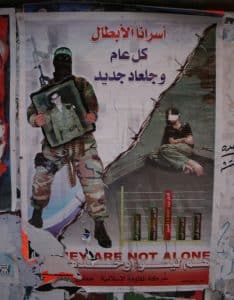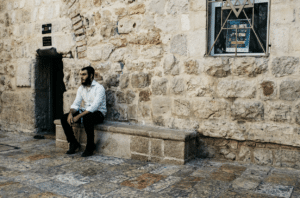We have been filled with joy to see some hostages returned at last and reunited with their families! The scenes of emotional embraces are so moving, and many tears have been shed—not only in Israel but wherever people have been praying. But what did it take to redeem those captives? Israel has had to agree to crippling military restrictions in their campaign to defeat Hamas, and three times as many Palestinian prisoners, held for terrorist activity—several with blood on their hands—are to be released. Israel is paying dearly to get each one home.
Bring them home
 The hostages will also be women and children, but not all of the 30 children will be released at this time because apparently Hamas is not able to locate them all.1 This news sends shudders down our spines. The negotiations are a tangled web, and the very thought of agreeing to terms set by terrorists is sickening. But the thought of those babies and little children, many of whom have lost one or both parents, is unbearable.
The hostages will also be women and children, but not all of the 30 children will be released at this time because apparently Hamas is not able to locate them all.1 This news sends shudders down our spines. The negotiations are a tangled web, and the very thought of agreeing to terms set by terrorists is sickening. But the thought of those babies and little children, many of whom have lost one or both parents, is unbearable.
The Israeli Welfare Ministry has given these instructions for IDF personnel as they escort the child hostages back home to Israel:
Try to have 1 soldier escort each child or family unit
The soldier should introduce himself: “Hi, I’m (name). I’m a soldier in the IDF and I am going to escort you home. You are in a safe place. I’m here to take care of you. You are safe.”
Soldiers should ask if the children are hot/cold, and if they’re thirsty. If the child has trouble walking they should ask “can I give you a hand? Is it ok if I lift you and help you walk?”
Soldiers can offer a hand or a hug but they are not to lift or hold a child without his or her permission. If there is no choice, then the soldier must talk them through it, and say “I’m going to hold you because…” “Now we have to be quiet, but we will speak soon”
It must have been extremely hard for the soldiers not to embrace the children immediately, but the instructions are for maximum sensitivity. We cannot imagine what they might have gone through in the last month and a half. Soldiers have also been instructed not to answer questions about the parents of the children, since the answers for many will be hard and it would be better to receive that news in a safe place back in Israel.
Conflict of the heart
 For all these reasons, you can see why the news of release is being contested by some who have suffered at the hands of the Palestinian prisoners to be set free. In agreeing to the terms of release, there will be a ceasefire where Israel’s objective of dismantling Hamas and its infrastructure has to be put on hold. Destroying Hamas is essential for the security of Israel and its citizens, after Hamas leaders have vowed to repeat the atrocities of October 7 over and over again. Equally, the security of Israel is compromised by the release of dangerous prisoners. But these painful concessions demonstrate the value of the life of each hostage.
For all these reasons, you can see why the news of release is being contested by some who have suffered at the hands of the Palestinian prisoners to be set free. In agreeing to the terms of release, there will be a ceasefire where Israel’s objective of dismantling Hamas and its infrastructure has to be put on hold. Destroying Hamas is essential for the security of Israel and its citizens, after Hamas leaders have vowed to repeat the atrocities of October 7 over and over again. Equally, the security of Israel is compromised by the release of dangerous prisoners. But these painful concessions demonstrate the value of the life of each hostage.
And it’s not just theoretical. When Israeli soldier, Gilad Shalit, was released, over 1000 Israeli held prisoners were set free, 280 of whom were serving life sentences for planning and perpetrating terror attacks. As it transpires, one of them ended up masterminding October 7. Either side of the scale is extremely weighty—the loss is great either way. But the grave losses Israel is prepared to sacrifice in order to redeem even one hostage says a great deal about how valuable the life of each citizen is to the state. Hamas knows this. And weaponizes it. They boast “We love death, the Israelis love life”, perceiving strength on their part and weakness on the side of Israel. As if love and life are weaknesses. They are certainly vulnerabilities, but in the end, as God’s word shows us, good, love, and life will triumph.
How much is a life worth?
The value of anything, in the end, is the price that someone is willing to pay for it. This speaks volumes to us about how precious we are to God, since He was willing to pay the highest price conceivable for our redemption. Interestingly, the word “captives” in the Hebrew Scriptures is also used as a way of talking about those needing salvation not only from captivity or exile, but also to people in need of spiritual rescue and redemption. Here is one familiar such passage from the prophet Isaiah:
“The Spirit of the Lord God is upon me,
because the Lord has anointed me
to bring good news to the poor;
he has sent me to bind up the brokenhearted,
to proclaim liberty to the captives,
and the opening of the prison to those who are bound.”
(Isaiah 61:1)
In Luke 4 we read that Jesus quoted this passage of Scripture, and applied it to Himself, saying: “Today this is fulfilled in your hearing” (Luke 4:21). In this case the passage is interpreted spiritually, rather than rescuing people in physical prisons. Jesus didn’t physically rescue John the Baptist from captivity and execution, but He did redeem millions—billions even—trapped in captivity of sin, with a death sentence under Satan’s watch. Through the sacrifice He paid in His own blood, He secured our release and bought our freedom.
When we think of the terrible dilemma before the Israeli leaders, weighing up what each life is worth, it helps us appreciate how much God loves and values each one of us.
God bursts into the enemy camp and breaks open the prison doors. He is the only one who has the power to release us from captivity, from the snares of death. In the ultimate act of redemption, He has the right to gather the captives and lead us out into freedom, as He did in the Exodus with Moses and the people of Israel. In Psalm 68, a prophetic Psalm about the glorious return of Jesus, we read:
You ascended on high,
leading a host of captives in your train
and receiving gifts among men,
even among the rebellious, that the Lord God may dwell there.
This picture of captives being led out by the Messiah as a picture of His salvation is picked up in Ephesians 4:7-8, which uses the passage in Psalm 68 to describe how God has given us gifts as believers. We also see this in Jeremiah 48, a prophecy concerning Moab, which is present day Jordan:
“Yet I will bring back the captives of Moab
In the latter days,” says the Lord. (Jeremiah 48:7)
Believers in Jordan have taken this as a hope of great salvation among their people in the latter days, just as there are promises of revival and glory in Elam (Iran) and a destiny for Egypt, Sheba and Dedan (Saudi Arabia and Yemen). Indeed, Jesus has paid for the release of all the peoples of their earth who have been condemned to death, by laying down His life for us on the cross. He is our Redeemer.
 Brother Andrew once offered to take the place of a hostage of Hezbollah, asking for his release. The leader of Hezbollah marveled: “What kind of Christianity is this?” It’s actually the regular kind. This is what Christ did for us. That’s how precious we are to Him, far more than precious jewels or any amount of money. There’s a macabre work of art by Damien Hirst in which a skull was meticulously covered in perfect diamonds, with a huge beauty of a diamond right in the forehead. It was valued at close to $100 million. But even that is not close to the value of one human life. Not even the most humble man or woman on the street. Our lives are of infinite value, because of the price that has been paid for them: the very blood of Jesus.
Brother Andrew once offered to take the place of a hostage of Hezbollah, asking for his release. The leader of Hezbollah marveled: “What kind of Christianity is this?” It’s actually the regular kind. This is what Christ did for us. That’s how precious we are to Him, far more than precious jewels or any amount of money. There’s a macabre work of art by Damien Hirst in which a skull was meticulously covered in perfect diamonds, with a huge beauty of a diamond right in the forehead. It was valued at close to $100 million. But even that is not close to the value of one human life. Not even the most humble man or woman on the street. Our lives are of infinite value, because of the price that has been paid for them: the very blood of Jesus.
“For God so loved the world, that he gave his only Son, that whoever believes in him should not perish but have eternal life. For God did not send his Son into the world to condemn the world, but in order that the world might be saved through him. Whoever believes in him is not condemned, but whoever does not believe is condemned already, because he has not believed in the name of the only Son of God.” (John 3:16-18)
Pray with us for all the captives to be released, both physically and spiritually. As children of God we want to grow up to be more like Him. We have inherited the love of life and hatred of death as values from our Father. This is our strength, not our weakness.
- Times of Israel, After chaotic delay, PM meets with families of hostages amid reports of imminent deal, November 20, 2023
- Photo by Tom Spender















